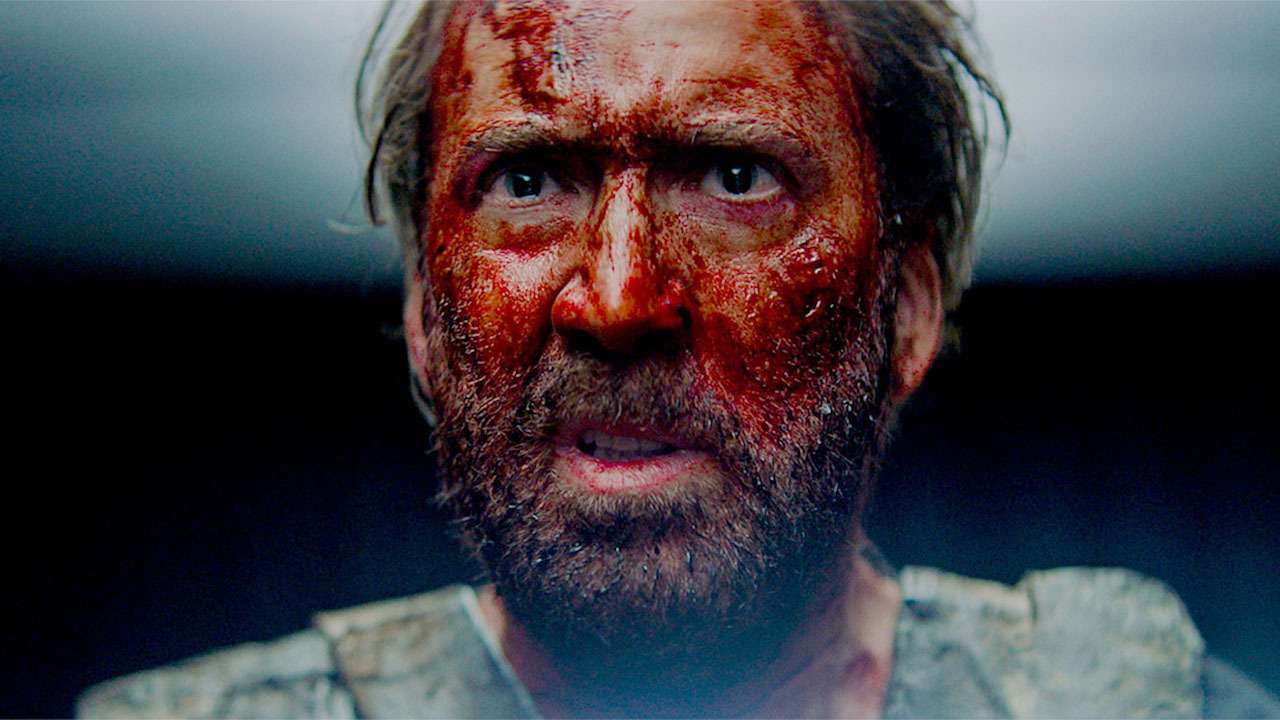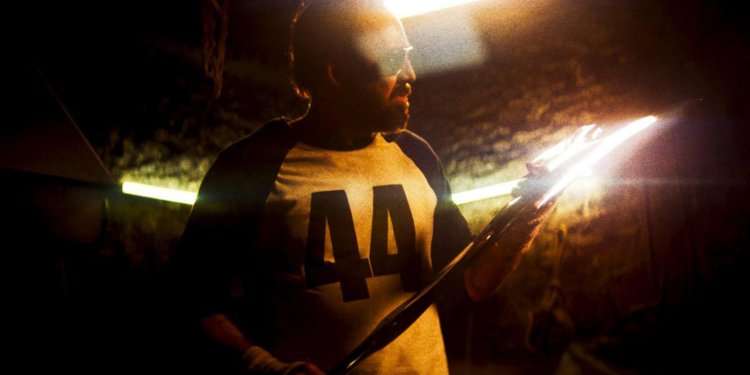Mandy Is a Testament to the Deranged Genius of Nicolas Cage
The actor and the meme have finally merged.

In November of 2010, video editor Harry Hanrahan posted a short compilation piece online titled Nicolas Cage Losing His Shit.
Hanrahan had spliced together four minutes and 14 seconds of, well, you can probably guess, and set it to Clint Mansell's haunting string score from Requiem For a Dream. The video pulls clips from nearly three decades of the actor's movies, from Vampire's Kiss to Leaving Las Vegas to Ghost Rider, focusing on discrete moments when Cage is at his most over-the-top.
At the time, YouTube was still in its adolescence, and this sort of cinematic supercut was still unusual enough to get written up in outlets like The Guardian, which helped it make the leap from internet ephemera into a minor classic of the early meme era. Since then, the video has been posted and reposted under various accounts and has racked up hundreds of thousands, perhaps millions, of views, and spawned countless imitations. I'm not entirely sure how many of those views I'm directly responsible for, but it's a lot. I'd estimate I've watched it dozens, and perhaps hundreds, of times over the last eight years, because it is a goddam masterpiece.
Plotless and surreal, hilarious and harrowing, it initially comes across as yet another chaotic, haphazard internet clip reel. But watch it enough times, and you eventually begin to see that it is deftly structured, with tension and punchlines, subtle organizational devices (a section devoted to Cage spouting profanity, a climactic sequence devoted entirely to Cage's bonkers-even-for-him performance in The Wicker Man) and even an arc of sorts, as Cage's performances go from weird to nervy to manic to truly, painfully desperate. The clips are arranged in a way that is often funny, but also deeply affecting. Cage channels a transcendent weirdness that transmorgrifies into a raw humanity. By the end, I always feel something for him—or, at the very least, the cinematic concept he embodies.
Hanrahan had captured Cage—not as a particular character in the context of a two hour long feature with a story and plot—but as something more like a pure cinematic abstraction, a creature without context. And in doing so, he had revealed two things: First, that Cage was some kind of bizarre genius, a sputtering, swearing, half-crazed poet of anguish and anger and pain whose inability (or unwillingness) to restrain himself is actually a sign of great control. And second, that Cage's penchant for batshit moments, which could sometimes be grating in the context of a conventional feature film, was in some ways better—more engaging, more hypnotic, more affecting—on a small screen, available to watch on repeat and on demand, in condensed and concentrated form. This was what Nicolas Cage was for.
I couldn't help but think of Nicolas Cage Losing His Shit as I watched Mandy, a brilliant and beautifully deranged horror fantasia that replicates much of the appeal of Hanrahan's supercut in feature form.
Directed by Panos Cosmatos from a sparse script by Cosmatos and Aaron Stewart-Ahn, the movie follows Cage as Red Miller, a man who lives in the woods with his true love, artist Mandy Bloom (Andrea Riseborough). Bloom is abducted by a cult led by Jeremiah Sand (Linus Roache), with the assistance of a gang of demonesque bikers. After Mandy refuses to submit to Jeremiah's sexual demands, the cult burns her alive as Red watches.

Red responds more or less the only way one can in a movie like this: by guzzling a bottle of vodka, retrieving a heavy-duty crossbow, smelting an oversized battle axe, and proceeding to brutally murder everyone involved. Shot with a rich and otherworldly color palette, and interspersed with long stretches with minimal dialogue, it's a revenge film so simple and primal that it almost feels plotless, less a story and more of a vibe.
Essentially, Cosmatos has cast Cage as a lonely warrior in a heavy metal fever dream, and the movie leans into its various fantasmagorical elements—the axe, which looks like it was summoned from a Frank Frazetta painting, the bikers, who are called from the depths via a strange horn and whose outfits are roughly what you'd expect if you went to an especially intense cosplay viewing of Hellraiser.
The moody photography and quasi-fantastic elements provide a sense of distance and artificiality from the often-ghoulish violence, and the general level of all-around freakiness nicely compliments Cage's maniac performance.
As Nicolas Cage performances go, this is one of the most Nicolas Cage-esque in years, maybe decades. I am not sure I have ever seen anything quite like it.
For the first hour, it's quiet, contained, almost serene, which only makes the contrast with the second hour more jarring. Cage embraces a kind of sheer, detached madness. This isn't the familiar Hollywood story of a badass avenger who makes righteous vengeance look cool. It is a portrayal of a man who has been profoundly broken, who has lost himself and devolved into something lesser, something darker and more primitive.
In Mandy's second hour, the Cage on screen begins to resemble the Cage in Nicolas Cage Losing His Shit. He is no longer a man situated in a recognizable human context; he becomes an abstraction, a concept, a demigod of derangement and despair. He is the cinematic incarnation of shit-losing. Just like the old internet supercut, Cage's performance in Mandy is simultaneously absurd, poetic, absorbing, and strangely affecting. It is another goddam masterpiece, because it understands: This is what Nicolas Cage is for.
This particular incarnation of Nicolas Cage is obviously not for everyone, and Mandy is obviously not your typical multiplex fare. Indeed, it's probable that most people won't see it at the multiplex: Although it has appeared on the big screen in limited engagements, it is primarily targeted at the video-on-demand market, where Cage has in recent years become an unlikely star. The combination of his lingering stardom and the low-budget economics of VOD, which have allowed Cage to star in four or five movies a year (partly in order to repay millions he owes to the IRS), make a film as strange and wonderful as this possible.
Today's video-on-demand movies are often compared to the direct-to-video offerings that took up so much Blockbuster Video shelf space during the VHS era, but here it plays more like an update of the midnight movie experience, vivid and violent and hallucinatory, except that online distribution means you'll be able to watch it wherever you want, and whenever the mood strikes you, in part or in whole.
Cage has recently expressed concern that viewers will see a meme rather than a movie, that a few outrageous moments will be all anyone remembers. But in Mandy, the meme and the man have merged, at least on screen; it's no longer possible to fully separate the two. Nor should anyone want to. The revelation of both the meme and the movie is that Nicolas Cage has never, and will never, stop losing his shit. Thank goodness.



Show Comments (28)